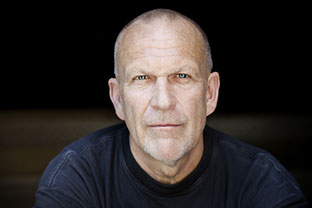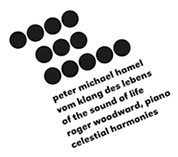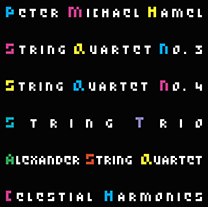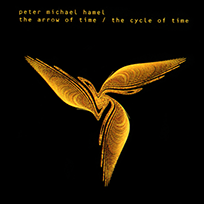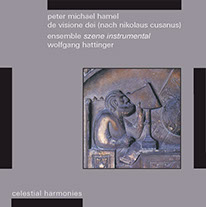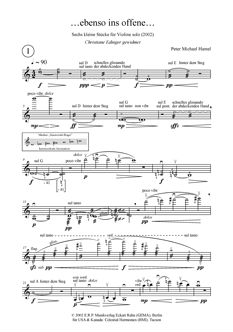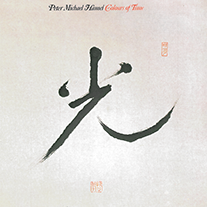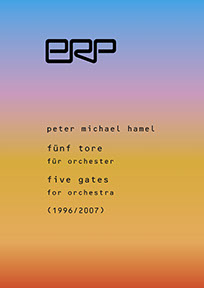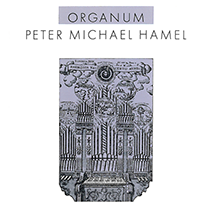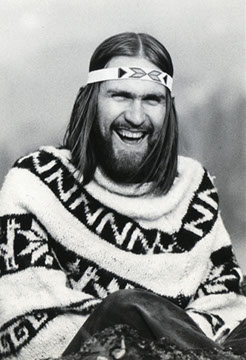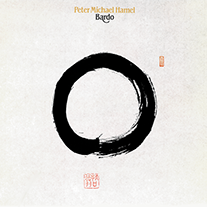
Peter Michael Hamel was born on July 15th, 1947 in Munich and received his first piano lesson from his aunt, Amalie Jensen-Pletsch, later adding the violin, the cello and the French horn. He studied composition from 1965-70, privately with Fritz Büchtger and then as a pupil of Günter Bialas at the Staatliche Musikhochschule in Munich. He also studied musicology with Thrasybulos Georgiades and Carl Dahlhaus, sociology and psychology in Munich and Berlin and became involved with Free Jazz, political cabaret, Musique concrète and electronics. He also produced music for plays and TV programmes by his father, Kurt Peter Hamel (1911-1979).
Between 1969 and 1974 Hamel worked principally with American composers such as Morton Feldman, John Cage and Terry Riley. He participated in Josef Anton Riedl's multimedia projects, attended seminars with Karlheinz Stockhausen, improvised with jazz musicians as well as with Luc Ferrari and Carl Orff and co-founded the ensemble Between, a group of international musicians with an interest in improvisation – six CDs of this ensemble have been reissued on Intuition/Wergo.
From 1971 Hamel began performing his own works as pianist, organist, vocalist and producer of electronic music on concert tours organised by the Goethe Institute that took him to Mumbai, Delhi, Madras, San Francisco, New York, Toronto, Seoul, Osaka, Kyoto, Rome, Dublin, Glasgow, Moscow, Madrid, Lisbon, Paris and Prague. During several journeys through Asia he immersed himself in the study of tonality and vocal styles of the Far East. His 1976 book Durch Musik zum Selbst (Through Music to the Self) drew on these studies as well as on reflections on the music and æsthetics of the time and has reached its seventh edition.
Hamel spent 1979-80 in Rome at the Villa Massimo where he composed his first full-scale stage work, Ein Menschentraum (A Human Dream), which was premiered in 1981 in Kassel in a production by Dieter Dorn.
He completed many lecture and concert tours through Europe, the USA and Asia from 1982 to 1990. During this time he composed much chamber music, including the 2nd String Quartet, premiered by the Kronos Quartet at the Darmstädter Ferienkurse in 1986, as well as the music for several plays at the Munich Kammerspiele and the lyrical opera Kassandra, premiered in 1987 at the Frankfurt Festen. His music was often performed at the IGNM World Music Days, the Salzburg Festival and the Berliner Festwochen.
Hamel wrote orchestral and choral music for the Donaueschinger Musiktage and for German radio. His first symphony, Die Lichtung was premiered by Sergiu Celibidache in 1988 to conclude the Munich Biennale – Hamel had attended Celibidache’s courses in phenomenology. In 1990 he composed a violin concerto for Christiane Edinger to be premiered in the Musica Viva concerts in Munich. From 1994-96 Hamel taught at the Musikhochschule in Graz as a guest professor.
The Munich Philharmonic commissioned and premiered his Missa to celebrate the 100th anniversary of the orchestra. He then composed further oratorios such as Passion, premiered with Dietrich Fischer-Dieskau, and Die Menschenrechte for several soloists and school choirs. Perhaps his most radical stage work is the 1990-96 Shoah, which combines opera and radio play in a reflection on the Holocaust; the orchestral excerpt Fünf Tore was premiered by the Sinfonieorchester of the North German Radio in 2009 in the Hamburg series das neue werk, conducted by Jens Georg Bachmann.
Hamel’s orchestral, choral and chamber music works are published by Bärenreiter, E.R.P. and Schott, and numerous recordings of his music are available from Wergo/Intuition and Celestial Harmonies. He has also produced music for television programmes and silent film scores for Bavarian Television (Passion, 1997) and German Television (SWD, Der lebende Leichnam, Dr. Caligari). Recent recordings include the 3rd and 4th String Quartet and String Trio with the Alexander Quartet and Vom Klang des Lebens with Roger Woodward who also gave the first performance of this 60-minute solo piano work at the Munich Gasteig in 2009. His Traumzeit was also recorded, by the Irish flautist William Dowdall.
From 1997-2012 Hamel was professor of composition and theory at the Hamburg Hochschule für Musik und Theater, as well as director of Studio 21 for Contemporary Music and coordinator of intercultural and interdisciplinary projects. Students from his class include successful and varied composers such as Jörn Arneke, Minas Borboudakis and Sascha Lino Lemke; students in his multimedia course included composers from Argentina, China, France, Greece, Colombia, Romania, Portugal and South Korea.
In 1998 Hamel founded the Intercultural Music Institute, in Aschau/Chiemgau (Bavaria), the main residence of his family. It is a forum for harmonic research, acoustic art, ethnomusicology, group improvisation and vocal and breathing technique, working both within and beyond academic confines.
For ten years Hamel was Principal of the music section in the Hamburg Freie Akademie der Künste and was accepted into the Bavarian Akademie der Schönen Künste in 2007. His 2nd Symphony Die Auflösung for Choir and Orchestra (2000-2007) was premiered at the 11th Munich Biennale in 2008. Excerpts from his work in progress last minute—a large scale project for the stage on the subject of near death experiences—were premiered in the Munich series Musica Viva on 18th June 2009.
Hamel has been awarded many prizes including awards from the cities of Bonn (1974), Stuttgart (1975) and Munich (1977), the GEMA Foundation (1981) and twice the Rostrum of Composers in Paris. He was Composer-in-Residence in Galway, County Mayo, Ireland and at the 1988 Schleswig Holstein Festival. In the same year he was awarded the Schwabinger Kunstpreis by the City of Munich. In 1994 he was prize winner in the Carl Orff Competition for Music Theatre. His choral music gained him the Gerhard Maasz Prize in 2007 and in November 2008 he was awarded the Gerda and Günter Bialas Composition Prize.
The German Minister for Culture and Media Bernd Neumann wrote on the occasion of Hamel’s 60th birthday: “…You are a wanderer between the worlds of music, a pioneer: your music draws upon a wide spectrum of traditions, from New Music, Jazz and Rock to influences from outside Europe. You have found ever new sources for your inspiration but created from it your own very original universe. Your cross-border explorations have hugely enriched the musical life in Germany, and you belong to the most exceptional composers of our time.”
Literature:
Peter Michael Hamel: Ein neuer Ton: Schriften zu einer ganzen Musik
(Allitera Verlag, Munich 2007)
Frank Helfrich: Zwischen den Welten: zum Komponieren von Peter Michael Hamel
(Pfau Verlag, Saarbrücken, 1999)
Foto oben:
Astrid Ackermann (musica viva, 2009)
Foto rechts unten:
Peter Michael Hamel (during the 1972 Olympic Games, München)
Foto oben: Zhang Liu (Xi'an, 2011)
CD covers and score cover
designed by Eckart Rahn
except ORGANUM designed by Irmgard Voigt
COLOURS OF TIME, BARDO and TRANSITION
designed by Hermann Wernhard
LET IT PLAY designed by Fernando Lippa
Calligraphy by Tetsuo Kiichi Nagaya
Notensatz by notengrafik berlin

